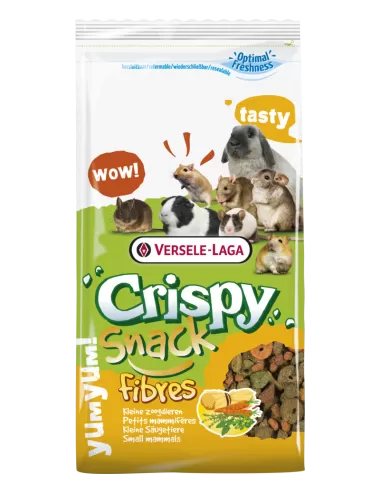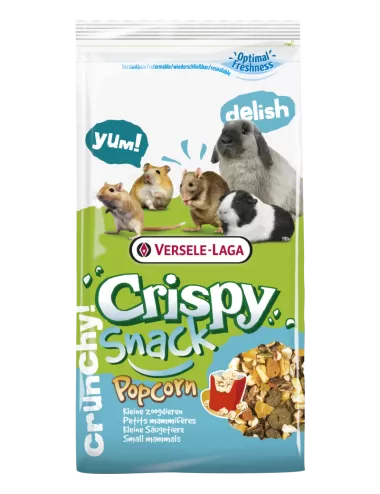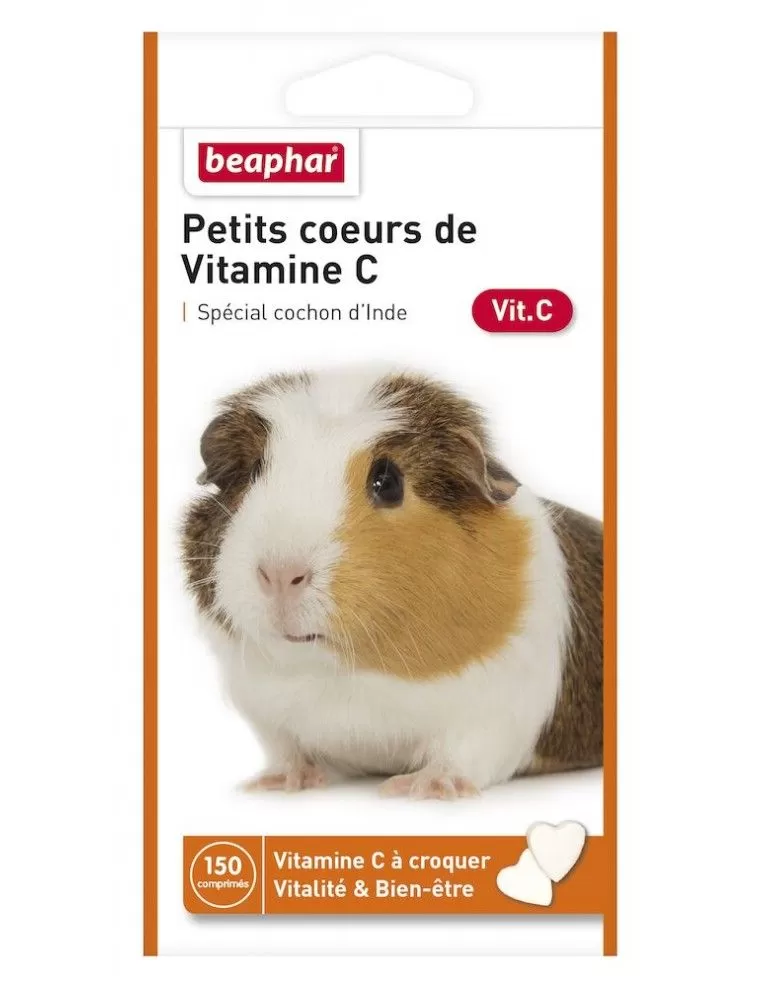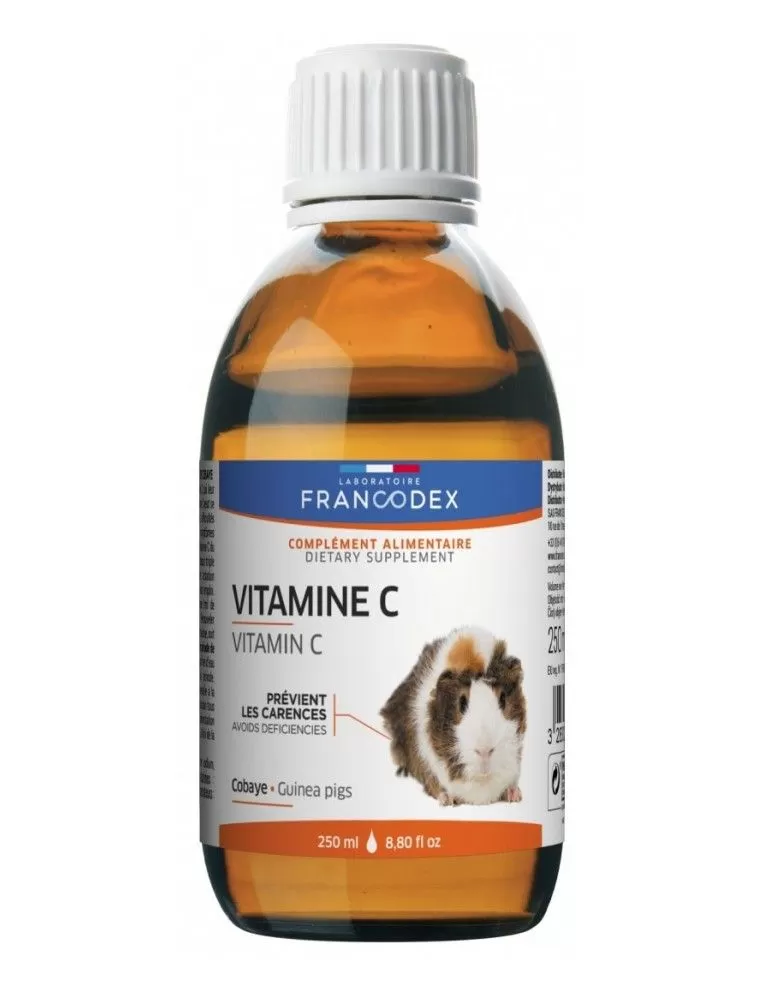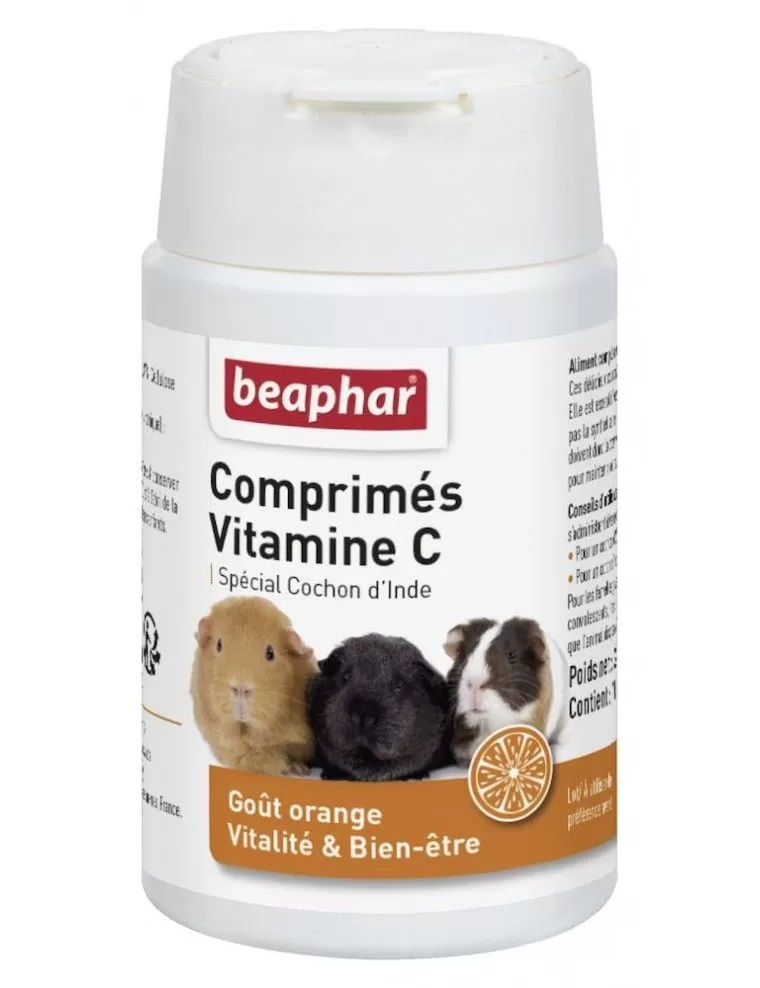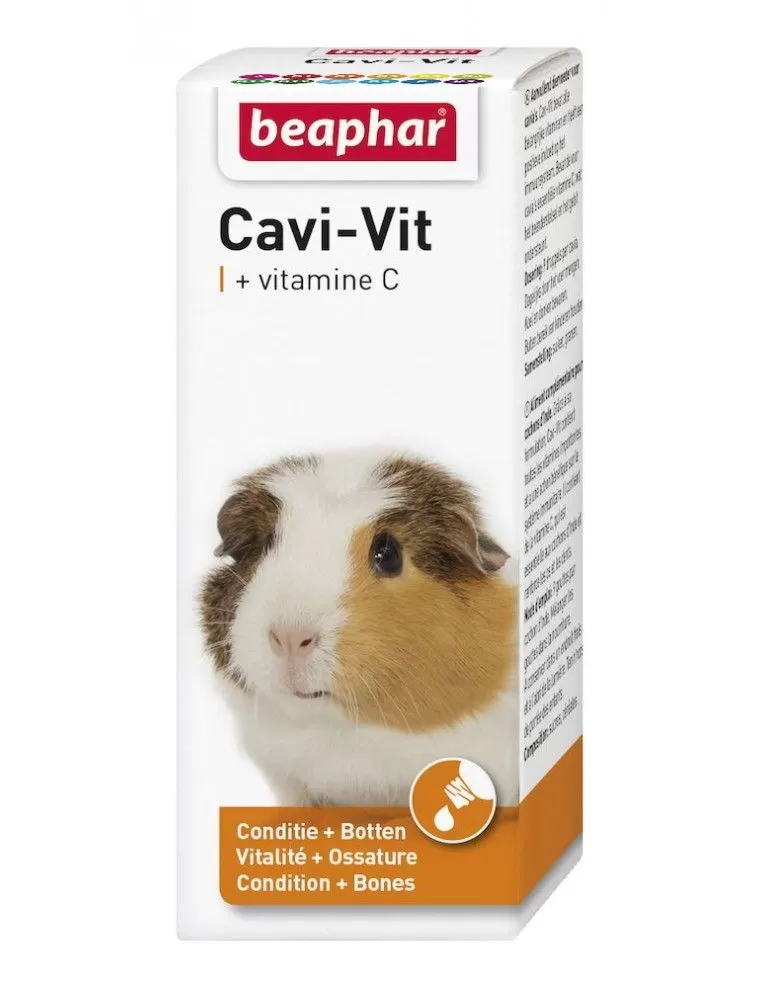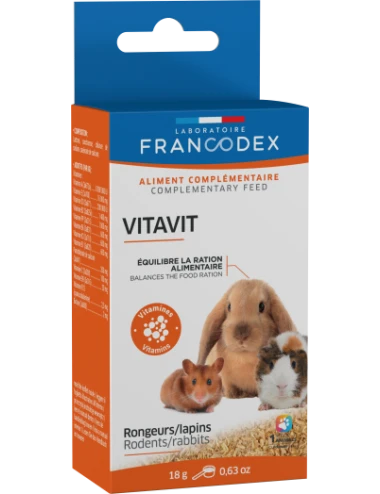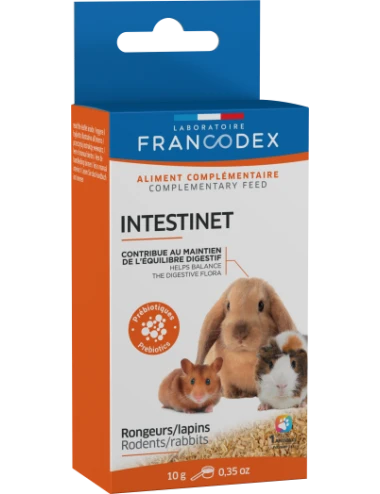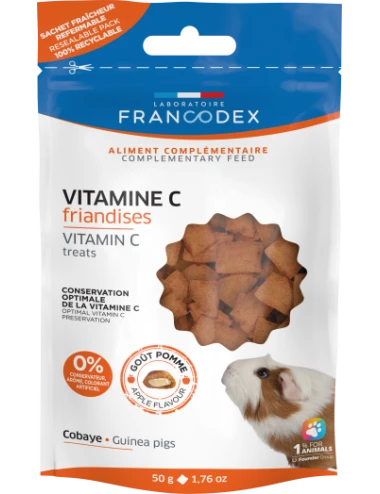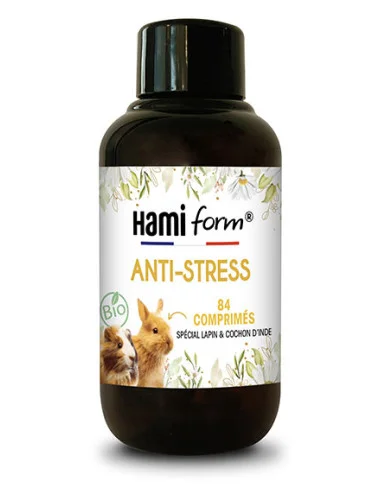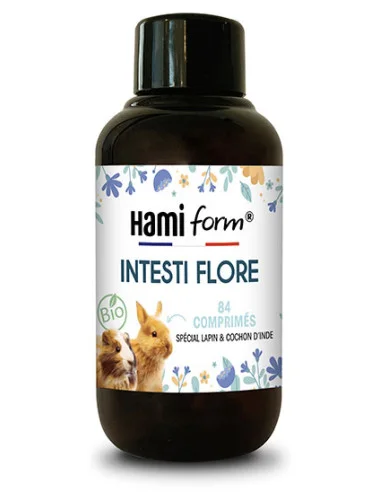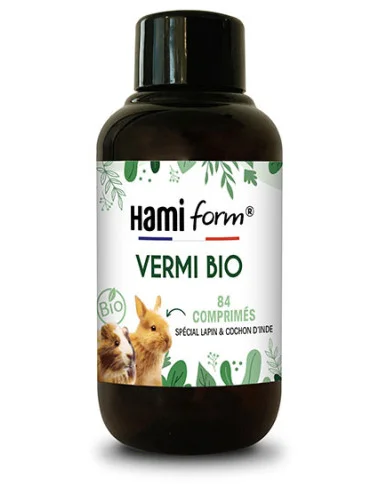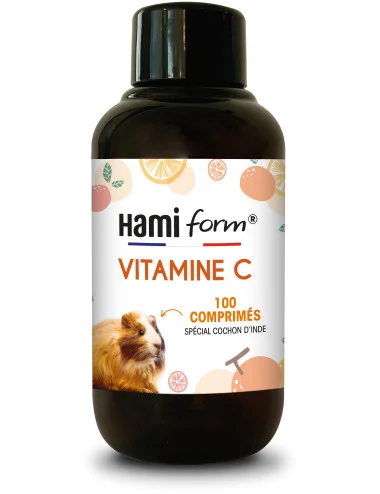- 2 in stock
Lives. C / Supplement Guinea pig/Guinea pig
Boost Your Guinea Pig's Health with Vitamin C
In the fascinating world of our rodent friends, the little guinea pig has a particularity that makes it absolutely unique: its crucial need for vitamin C. At Le Petit Rongeur, we understand the importance of this nutritional requirement and have to heart to offer a complete range of vitamin C supplements, specially designed for these adorable companions. Discover renowned brands such as DégustonFoin , Mas de l'Aqueduc , Beaphar , and many others, all chosen for their commitment to the health of your little one.
Why is vitamin C so crucial?
Imagine for a moment: your little companion, lively and curious, exploring his space with joy. However, without sufficient vitamin C intake, this image could quickly become tarnished. Guinea pigs, due to a specific genetic mutation, cannot produce this essential vitamin on their own. The consequence ? An increased risk of deficiencies, the source of multiple health problems, ranging from simple joint pain to more serious complications. At Le Petit Rongeur, we take this matter to heart and offer suitable solutions to keep your companion in great shape.
The undisputed benefits of vitamin C
Vitamin C doesn’t just fill a need; she works like a real superhero within your guinea pig's body. A powerful antioxidant, it plays a key role in iron absorption, contributes to cell renewal and ensures the proper functioning of the immune system. With a suitable supplement, your pet will benefit from better growth, strong teeth, and unfailing vitality. At Le Petit Rongeur, each product is selected to maximize these essential benefits.
Choosing the right vitamin C supplement
With so many options available, selecting the ideal supplement for your guinea pig can seem complex. Tablets, syrups, enriched granules... each format has its advantages. At Le Petit Rongeur, our selection includes a variety of shapes and brands, so you can easily find the product that best fits your little companion's eating routine. Our team is here to guide you, ensuring that your choice is not only appropriate, but also appreciated by your pet.
Daily supplementation: a necessity
Commitment to your guinea pig's health requires daily attention to its nutritional needs. Vitamin C, the pillar of its well-being, must be administered regularly to prevent deficiencies and ensure a long and happy life for your companion. At Le Petit Rongeur, we understand this responsibility and offer a selection of products that are easy to administer, thus promoting a care routine that is both simple and effective. Entrust us with the well-being of your guinea pig: together, let's celebrate their health and joy of life.
Lives. C / Supplement
Boost Your Guinea Pig's Health with Vitamin C
In the fascinating world of our rodent friends, the little guinea pig has a particularity that makes it absolutely unique: its crucial need for vitamin C. At Le Petit Rongeur, we understand the importance of this nutritional requirement and have to heart to offer a complete range of vitamin C supplements, specially designed for these adorable companions. Discover renowned brands such as DégustonFoin , Mas de l'Aqueduc , Beaphar , and many others, all chosen for their commitment to the health of your little one.
Why is vitamin C so crucial?
Imagine for a moment: your little companion, lively and curious, exploring his space with joy. However, without sufficient vitamin C intake, this image could quickly become tarnished. Guinea pigs, due to a specific genetic mutation, cannot produce this essential vitamin on their own. The consequence ? An increased risk of deficiencies, the source of multiple health problems, ranging from simple joint pain to more serious complications. At Le Petit Rongeur, we take this matter to heart and offer suitable solutions to keep your companion in great shape.
The undisputed benefits of vitamin C
Vitamin C doesn’t just fill a need; she works like a real superhero within your guinea pig's body. A powerful antioxidant, it plays a key role in iron absorption, contributes to cell renewal and ensures the proper functioning of the immune system. With a suitable supplement, your pet will benefit from better growth, strong teeth, and unfailing vitality. At Le Petit Rongeur, each product is selected to maximize these essential benefits.
Choosing the right vitamin C supplement
With so many options available, selecting the ideal supplement for your guinea pig can seem complex. Tablets, syrups, enriched granules... each format has its advantages. At Le Petit Rongeur, our selection includes a variety of shapes and brands, so you can easily find the product that best fits your little companion's eating routine. Our team is here to guide you, ensuring that your choice is not only appropriate, but also appreciated by your pet.
Daily supplementation: a necessity
Commitment to your guinea pig's health requires daily attention to its nutritional needs. Vitamin C, the pillar of its well-being, must be administered regularly to prevent deficiencies and ensure a long and happy life for your companion. At Le Petit Rongeur, we understand this responsibility and offer a selection of products that are easy to administer, thus promoting a care routine that is both simple and effective. Entrust us with the well-being of your guinea pig: together, let's celebrate their health and joy of life.
- 1 in stock
- in replenishment
- 3 in stock
- in replenishment
- in replenishment
- 3 in stock
- in replenishment
- 3 in stock
- 1 in stock
- 4 in stock
- 4 in stock
- 3 in stock
Questions / Réponses
Les cochons d'Inde ne peuvent pas produire leur propre vitamine C et doivent l'obtenir de leur alimentation pour prévenir le scorbut, une maladie causée par une carence en vitamine C. Les symptômes incluent léthargie, saignements des gencives, faiblesse articulaire et plus. Un apport quotidien en vitamine C est donc vital pour leur santé générale.
En général, un cochon d'Inde adulte a besoin d'environ 10 à 30 mg de vitamine C par jour, mais les besoins peuvent augmenter jusqu'à 50 mg pour les femelles en gestation, les jeunes en croissance, ou les animaux malades. Il est important de consulter un vétérinaire pour des recommandations spécifiques basées sur l'âge, le poids, et l'état de santé de l'animal.
La vitamine C peut être administrée à travers des légumes frais riches en vitamine C, des compléments alimentaires spécifiques, ou des granulés enrichis en vitamine C. Les légumes comme le poivron rouge et le persil sont d'excellentes sources. Les suppléments liquides peuvent être ajoutés à l'eau de boisson ou administrés directement, mais l'ajout à l'eau peut réduire son acceptation en raison du changement de goût.
Bien que les granulés enrichis en vitamine C puissent contribuer à satisfaire les besoins quotidiens en vitamine C, ils ne devraient pas être la seule source. La vitamine C se dégrade rapidement dans les aliments, surtout en présence de lumière et de chaleur. Il est donc recommandé de compléter l'alimentation avec des légumes frais riches en vitamine C pour s'assurer que les cochons d'Inde reçoivent une quantité adéquate.
Bien que les fruits soient une source de vitamine C, ils contiennent également des sucres élevés et devraient être donnés en modération comme friandises. Les légumes à faible teneur en sucre, comme les poivrons et le chou kale, sont préférables pour un apport quotidien en vitamine C sans augmenter le risque de surpoids ou de problèmes dentaires.
La vitamine C est hydrosoluble, ce qui signifie que tout excès sera éliminé dans l'urine, rendant le surdosage peu probable. Cependant, des quantités excessives peuvent causer des problèmes digestifs, tels que des diarrhées. Il est donc important de suivre les recommandations de dosage et de consulter un vétérinaire pour des conseils personnalisés.
Les signes d'une carence en vitamine C chez les cochons d'Inde incluent une faiblesse, des difficultés à marcher, un gonflement des articulations, des saignements des gencives, et un pelage rêche. À la première apparition de ces symptômes, il est crucial de consulter un vétérinaire. Un apport adéquat en vitamine C peut prévenir ces symptômes et contribuer à une vie longue et saine pour votre cochon d'Inde.
